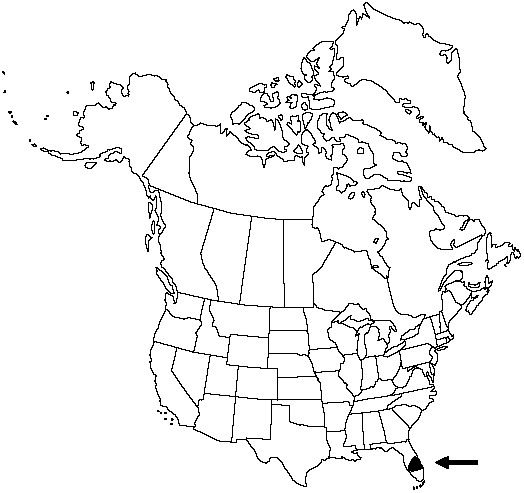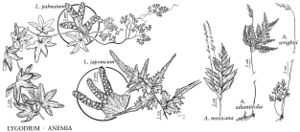Difference between revisions of "Anemia wrightii"
in Hooker & Baker,Syn. Fil. 10: 435. 1868.
FNA>Volume Importer |
FNA>Volume Importer |
||
| Line 44: | Line 44: | ||
|publication year=1868 | |publication year=1868 | ||
|special status= | |special status= | ||
| − | |source xml=https://jpend@bitbucket.org/aafc-mbb/fna-data-curation.git/src/ | + | |source xml=https://jpend@bitbucket.org/aafc-mbb/fna-data-curation.git/src/f50eec43f223ca0e34566be0b046453a0960e173/coarse_grained_fna_xml/V2/V2_62.xml |
|genus=Anemia | |genus=Anemia | ||
|species=Anemia wrightii | |species=Anemia wrightii | ||
Revision as of 20:51, 16 December 2019
Stems ca. 1 mm diam. Leaves entirely dimorphic. Sterile leaves 4–10 × 1.4–2.5 cm. Petiole green to straw-colored, 1/2–3/4 length of leaf, ca. 0.3 mm wide, glabrous. Blade deltate, 2-pinnate, papery to somewhat leathery. Pinnae 2–4 pairs, alternate to subopposite, segments oblanceolate, base cuneate, margins minutely denticulate, apex obtuse, sparsely pilose with stiff white hairs. Fertile leaves 6–25 cm, much taller than sterile leaves. Petiole 3/4–9/10 length of leaf. Pinnae compact, short-petiolulate, 1–6 mm. Spores with ridges anastomosing.
Habitat: Rare around exposed to lightly shaded solution holes and limestone sinks
Elevation: 0 m
Distribution

Fla., West Indies in Bahamas, Cuba.
Discussion
Anemia wrightii has been misidentified in Florida as A. cicutaria Kunze ex Sprengel (of Mexico in Yucatan; West Indies in the Bahamas, Cuba; and Central America in Guatemala), but that species has 3-pinnate sterile blades, abundant blade hairs, and fertile leaves that are more open with 4–5 pairs of long-petiolulate pinnae.
Selected References
None.
